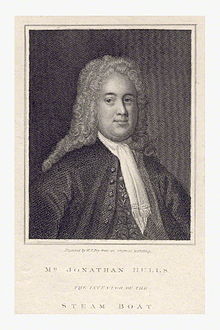Jonathan Hulls or Hull (baptised 1699 – 1758) was an English inventor, a pioneer of steam navigation. Traditionally, he was recognised as the first person to make practical experiments with steam to propel a vessel; but evidence to substantiate the claim that he did more than propose a steam vessel on paper is lacking.[1]

Life
editHulls was born at Hanging Aston, Gloucestershire. It has been suggested that the background to the efforts of Hulls was the 1734 publication in the abridged Philosophical Transactions of a paper by the French engineer Monsieur Duquet on ships and mechanical propulsion.[1] Duquet was a controversialist also active at that time in a debate on his ideas with Henri Pitot.[2] He died in the middle of 1758 in Broad Campden, where he had lived almost all his adult life.[1]
Work
editThe protection of his invention by Hulls depended on the financial support of his neighbour named Freeman at Batsford Park.[1] The patent for the invention by Hulls is dated 21 December 1736, and his account of it appeared as Description and Draught of a new-invented Machine for carrying Vessels or Ships out of or into any Harbour, Port, or River against Wind and Tide, or in a Calm; for which his Majesty has granted Letters-patent for the sole benefit of the Author for the space of fourteen years (London, 1737). It was reprinted in facsimile in 1855.[3]
A Newcomen engine was to be set up on a tow-boat in front of another vessel, connected by a tow-rope. Six paddles in the stern of the tow-boat were to be fastened to a cross axis connected by ropes to another axis which was turned by the engine. Hulls showed how to convert the rectilineal motion of a piston-rod into a rotatory motion.[3]
The Oxford Dictionary of National Biography casts doubt on the traditional story about practical trials by Hulls.[1] The Dictionary of National Biography first edition related that they were made on River Avon at Evesham in 1737; that they were a failure; and that Hulls was the butt of humour.[3]
In 1754 Hulls published The Art of Measuring made Easy by the help of a new Sliding Scale; he also wrote the Maltmakers' Instructor.[3]
Influence
editAugustus De Morgan says that Hulls's work very likely gave suggestions to William Symington; and that Erasmus Darwin was thinking of Hulls when he prophesied that steam would soon "drag the slow barge".[3]
Notes
edit- ^ a b c d e Robinson, J. C. "Hulls, Jonathan". Oxford Dictionary of National Biography (online ed.). Oxford University Press. doi:10.1093/ref:odnb/14115. (Subscription or UK public library membership required.)
- ^ Journal des savants (in French). Librairie Klincksieck. 1729. p. 537.
- ^ a b c d e Lee, Sidney, ed. (1891). . Dictionary of National Biography. Vol. 28. London: Smith, Elder & Co.
- Attribution
This article incorporates text from a publication now in the public domain: Lee, Sidney, ed. (1891). "Hulls, Jonathan". Dictionary of National Biography. Vol. 28. London: Smith, Elder & Co.